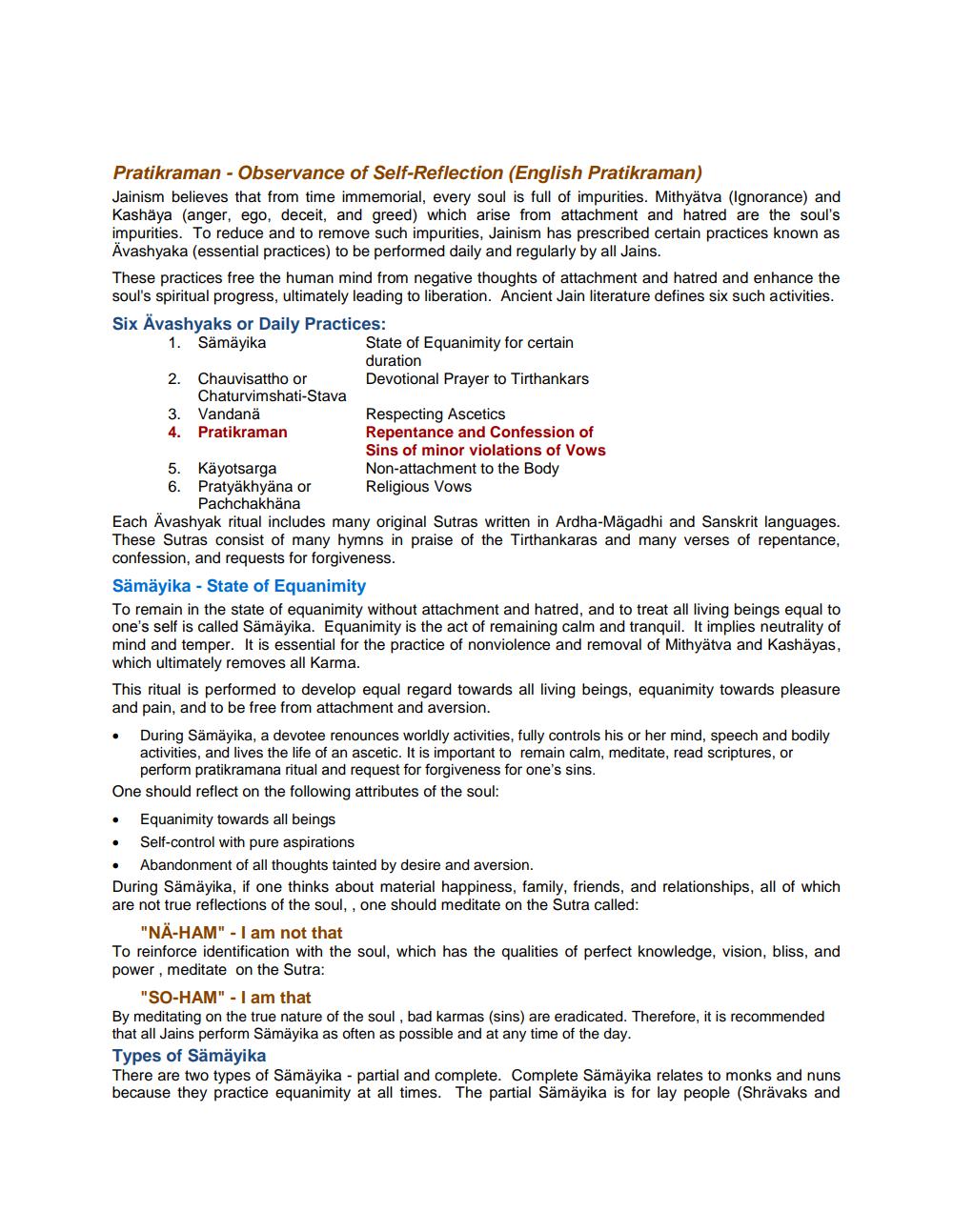________________
Pratikraman - Observance of Self-Reflection (English Pratikraman) Jainism believes that from time immemorial, every soul is full of impurities. Mithyatva (Ignorance) and Kashaya (anger, ego, deceit, and greed) which arise from attachment and hatred are the soul's impurities. To reduce and to remove such impurities, Jainism has prescribed certain practices known as Avashyaka (essential practices) to be performed daily and regularly by all Jains. These practices free the human mind from negative thoughts of attachment and hatred and enhance the soul's spiritual progress, ultimately leading to liberation. Ancient Jain literature defines six such activities. Six Ävashyaks or Daily Practices: 1. Sämäyika
State of Equanimity for certain
duration 2. Chauvisattho or Devotional Prayer to Tirthankars
Chaturvimshati-Stava 3. Vandana
Respecting Ascetics 4. Pratikraman
Repentance and Confession of
Sins of minor violations of Vows 5. Käyotsarga
Non-attachment to the Body 6. Pratyakhyana or Religious Vows
Pachchakhana Each Ävashyak ritual includes many original Sutras written in Ardha-Magadhi and Sanskrit languages. These Sutras consist of many hymns in praise of the Tirthankaras and many verses of repentance, confession, and requests for forgiveness. Sämäyika - State of Equanimity To remain in the state of equanimity without attachment and hatred, and to treat all living beings equal to one's self is called Sämäyika. Equanimity is the act of remaining calm and tranquil. It implies neutrality of mind and temper. It is essential for the practice of nonviolence and removal of Mithyatva and Kashayas, which ultimately removes all Karma. This ritual is performed to develop equal regard towards all living beings, equanimity towards pleasure and pain, and to be free from attachment and aversion. • During Sämäyika, a devotee renounces worldly activities, fully controls his or her mind, speech and bodily
activities, and lives the life of an ascetic. It is important to remain calm, meditate, read scriptures, or
perform pratikramana ritual and request for forgiveness for one's sins. One should reflect on the following attributes of the soul: • Equanimity towards all beings
Self-control with pure aspirations
Abandonment of all thoughts tainted by desire and aversion. During Sämäyika, if one thinks about material happiness, family, friends, and relationships, all of which are not true reflections of the soul, , one should meditate on the Sutra called:
"NÄ-HAM" - I am not that To reinforce identification with the soul, which has the qualities of perfect knowledge, vision, bliss, and power, meditate on the Sutra:
"SO-HAM" - I am that By meditating on the true nature of the soul, bad karmas (sins) are eradicated. Therefore, it is recommended that all Jains perform Sämäyika as often as possible and at any time of the day. Types of Sämäyika There are two types of Sämäyika - partial and complete. Complete Sämäyika relates to monks and nuns because they practice equanimity at all times. The partial Sämäyika is for lay people (Shrävaks and




